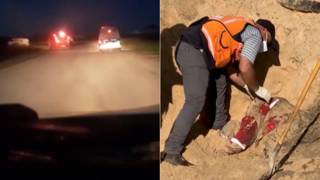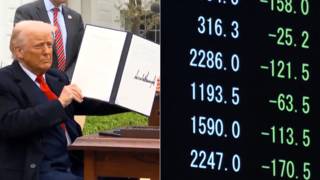
A report just released by U.S. PIRG shows that 318 political action committees (PACs) affiliated with polluting industries and related interests that benefit from more than $31 billion in taxpayer subsidies contributed nearly $113 million to congressional candidates from January 1991 through December 1997.
The report, “Feeding at the Trough: Big Campaign Contributions Mean Bigger handouts to Polluters,” also examines the 105th Congress’s votes on “polluter pork” programs that waste tax dollars and harm the environment.
Transcript
AMY GOODMAN: You are listening to Pacifica Radio’s Democracy Now! The Exception to the Rulers. I’m Amy Goodman.
A report just released by U.S. PIRG shows that 318 political action committees, known as PACs, affiliated with polluting industries that benefit from more than $31 billion in taxpayer subsidies, contributed more than $100 million to congressional candidates from January ’91 through the end of 1997.
We’re joined right now by Anna Aurilio. She is the director of U.S. PIRG’s Campaign to Cut Polluter Pork.
Welcome to Democracy Now!
ANNA AURILIO: Hi. Happy Earth Day!
AMY GOODMAN: Happy Earth Day to you, too. Well, tell us about this report, “Feeding at the Trough: Big Campaign Contributions Mean Bigger Handouts to Polluters.”
ANNA AURILIO: Well, what we did is the PIRGs looked at big campaign contributions, and we found that they’re a great investment. If you’re a polluter and you want a taxpayer handout, your best investment is to give money to your local congressional candidate. In the last year, the House and the Senate had 23 opportunities to cut polluter pork. These are programs that hurt our environment and waste taxpayer dollars. If they had voted yes on all of these, they would have — we would have saved $1 billion. Taxpayers would have saved $1 billion and prevented numerous environmental destructive programs. And yet, the House and Senate only voted to cut polluter pork once. And in fact, they didn’t even vote to cut a program; they just voted against a bill to expand a program. So this is a good investment. It’s a 275-to-one return on their money, at least. And it’s outrageous. It highlights the need to get big money out of politics.
AMY GOODMAN: Let’s talk some specifics. What are the corporations that have been contributing, and what have they gained?
ANNA AURILIO: Well, specifically, you had a person on before that’s camping out in a redwood in ancient forest, because we’ve got to save our ancient forests because less than 5% of them remain. Companies like Weyerhaeuser and Louisiana-Pacific have been clearcutting our national forests at taxpayers’ expense. Taxpayers lose $200 million a year, at least, because the Forest Service mismanages our forests. That’s a huge subsidy for the timber industry. We’re paying to destroy our forests. And some of the environmental problems she listed, like mudslides and water quality deterioration, all of that, again, that’s taxpayer-subsidized destruction of our national resources. Timber-related PACs gave $10.3 million over seven years. They received at least a $1.4 billion subsidy over that same period. So, again, timber companies clearcut our forests. Taxpayers get the shaft.
AMY GOODMAN: I think that’s pretty appropriate, considering — at least to talk about this, considering our last conversation with Julia Butterfly up in a redwood tree. Talk about the tobacco industry,
ANNA AURILIO: Sure. Well, the tobacco industry, as we all know, is one of the most heinous industries out there. And U.S. PIRG has been fighting hard on a number of different fronts to make sure that they stop poisoning our young people. But also, people should be outraged to learn that we are also subsidizing the production of tobacco. U.S. taxpayers over the last seven years subsidized the tobacco industry to the tune of at least $658 million. That’s our money that’s going to help produce tobacco. It is the only agricultural product that kills when used as directed. The tobacco-related PACs during the same time gave $8.3 million in campaign contributions. Again, if we want to get Joe Camel out of Congress, we have to get the big money out of politics.
AMY GOODMAN: I’m looking at your segment on specific polluter pork programs and the role of money in protecting them — fossil energy programs. We’re hearing a lot now about SUVs, about suburban utility vehicles — sports utility vehicles. And more and more people are buying bigger and bigger cars. It’s as if we’re back in the ’70s, and the sky is the limit, or there is no limit.
ANNA AURILIO: It’s absolutely outrageous. And this is actually something that the Green Scissors coalition, which PIRGs are a part of, are going to start investigating. Green Scissors is a campaign to cut the federal budget using green scissors. PIRG is a part of it. Friends of the Earth and Taxpayers for Common Sense are all leaders in it. It’s a unique coalition of environmentalists and taxpayers.
One of the things that we’ve identified so far is a really outrageous loophole in the energy efficiency standards. Right now cars and trucks are required to meet certain energy efficiency standards, which are much too low and are contributing to a rise in global climate change. But one of the things that we’ve discovered is that there’s actually a loophole, that if you build a car or a truck that’s heavy enough, it actually doesn’t have to meet the standard. It escapes that. And I believe it’s a Ford Explorer, that they’re now building, that’s going to be so big and so heavy, it doesn’t have to meet energy efficiency standard. It will be allowed to pollute more and not be subject to the so-called gas guzzler taxes. It’s totally outrageous.
AMY GOODMAN: It’s frightening. I just saw a report on ABC News last night, and the reporter ended with a comment that he was talking to car dealers, who said that when there is a major accident, when an SUV hits a smaller car — and this is a real danger now all over the country — they’re destroying these littler cars. And it’s a danger to people driving smaller vehicles, that it’s a great boon to the car dealerships that sell SUVs, because people get afraid, and they, too, feel they have to get larger cars.
ANNA AURILIO: It’s absolutely despicable. And again, one of the reasons why we don’t have better fuel economy standards, why we don’t have cleaner cars, why we don’t have more efficient cars, while these huge behemoths can continue to rampage on our roads, is because of the influence of money in politics. The car industry has a gridlock on Congress. There is no way Congress, and for that matter, the Clinton administration right now, is even really considering strengthening fuel economy standards and pollution standards for cars and light trucks. It’s one of the biggest sources of pollution. It’s the biggest single step towards curbing global warming, and they won’t do it. Why? Because of big money.
AMY GOODMAN: And we’re talking about a new report that’s come out from U.S. PIRG. In just a minute, we’ll give you information on how you can get it. We’re joined by Anna Aurilio, who is director of U.S. PIRG’s Campaign to Cut Polluter Pork. What does the Mining Law of 1872 have to do with pollution?
ANNA AURILIO: Well, PIRG calls this the granddaddy of all anti-environmental subsidies. This is a 126-year-old corporate welfare program. Basically, it says that if you’re a mining company and you want to mine on public lands, go ahead and do it. Until three years ago, if you wanted to purchase our public lands, that belong to all of us, you could do that for $2.50 to $5 an acre. That’s an 1872 price. Luckily, the Green Scissors coalition and others joined forces to actually put a moratorium on this land sale practice. So, that’s in effect. Unfortunately, there’s 600 applications to buy land that have been grandfathered. But nonetheless, under that law, you can buy land, you can mine public lands. And guess what: Not a single penny goes to the taxpayers. We don’t charge any royalties on the billions of dollars’ worth of minerals taken off our public lands. And when the mining company leaves a mess and leaves the country, taxpayers get left holding the bag for cleanup. It’s totally ridiculous. It’s 126 years old. And part of the reason why we can’t get reform of this outrageous law is that the mining industry poured $19 million, nearly $20 million, actually, in campaign contributions over the last seven years.
AMY GOODMAN: What about the sugar program?
ANNA AURILIO: Oh, sugar, that’s a great one. Down in Florida, there are some sugar cane growers that have done the most damage to the Florida Everglades. Fertilizer and pesticide runoff have really done an enormous amount of damage to the Florida Everglades. They benefit from actually a consumer subsidy. This isn’t so much a taxpayer subsidy as a program that basically results in sugar prices costing all of us $1.4 billion more a year than they otherwise ought to. And this props up a handful of rich cane growers in Florida. And again, it’s a great payback for them: $6.3 million in campaign contributions, and they get to charge us higher prices. They get much, much higher prices for their sugar. The PIRGs say that we need to reform the sugar program and stop destruction of the Everglades.
AMY GOODMAN: Let’s talk about not just some names of polluters, but some names of congressmembers. You have an appendix that deals with House and Senate heroes and zeros.
ANNA AURILIO: This is a really disappointing part of our study this year. This year, there was only one senator who voted to cut polluter pork all the time, and that was Senator Judd Gregg. That’s absolutely outrageous that —
AMY GOODMAN: From?
ANNA AURILIO: Oh, he’s a Republican from New Hampshire. He actually sponsored a lot of the amendments to cut some of these programs. And that’s absolutely outrageous, when you consider there are 99 other senators that could not find it in their heart to cut polluter pork 100% of the time. In the House, we’ve actually seen a remarkable decrease in the number of people who will always vote to cut these wasteful and harmful programs. This year, we only had nine members — oh, 15 members of the House and — I’m sorry, we only had nine members of the House consistently voting to cut polluter pork programs this year. The number of people who always support these programs — that is, the number of members of the House and members of the Senate who always vote to keep handing our money to polluters — has risen. In 1996, only 15 House members consistently supported these outrageous programs, and 49 so far have always supported these programs, including House Speaker Newt Gingrich. Now, he votes at his discretion, but he has never chosen in this Congress to cut polluter pork, and in fact, in the vote to cut the timber subsidies last year, which we lost in the House by one vote, he was a deciding vote.
AMY GOODMAN: Can you name some of those heroes, some of those people who have continuously voted to cut pork?
ANNA AURILIO: Absolutely. We’ve got Bob Andrews, a Democrat in New Jersey. And again, pork knows no party. Democrats and Republicans tend to support pork. The Clinton administration is almost as bad as the Congress when it comes to that. And then, in terms of our heroes, as well, we’ve got a bipartisan mix.
So, Bob Andrews, a Democrat of New Jersey; Mr. Ramstad, a Republican in Minnesota; Bill Luther, Democrat from Minnesota; Chris Shays, Republican from Connecticut; Lois Capps, Democrat from California — now, she just got elected, so it’s a little bit — you know, she only really voted once, but we’ll put her on the list and see if she can keep her record going; again, Gregory Meeks, a new Democrat from New York, he’s in that same category, just got elected, but let’s see if he can keep that 100% going; Congressman Meehan from Massachusetts and Ed Markey from Massachusetts, both Democrats, were all House zeros [sic]. And again, the lone Senate hero —
AMY GOODMAN: House heroes?
ANNA AURILIO: House heroes. They were members of the House who voted to cut polluter pork 100% of the time.
AMY GOODMAN: And others that you consider the worst, outside of Gregg?
ANNA AURILIO: Oh, no, Judd Gregg is a Senate hero. He’s the only one in the Senate who voted to cut polluter pork 100% of the time.
AMY GOODMAN: Oh, he’s — uh-huh.
ANNA AURILIO: Yeah, he’s the lone senator. The worst, besides Speaker of the House Newt Gingrich, well, there’s a whole cast of powerful House leaders that are on the zeros list. These are people that took a lot of money from polluters and voted to support the handouts all the time. Commerce Committee Chairman Tom Bliley, for example, who announced, when he became chairman, that there would be no more tobacco hearings, one of the largest recipients of polluter pork PAC money and also never votes to cut these programs. Congressman Livingston, he’s chair of the House Appropriations Committee. That’s the committee that makes the decisions to waste your money on these programs. A couple of zeros in the Senate, people who should really be ashamed of themselves, both of the Alaska senators, people who support basically pillaging the entire state of Alaska for the benefit of the timber and the oil companies. They receive a lot of money from polluters. They never vote to cut the pork. Someone who’s really disappointing, who ought to be doing a lot better, is Max Baucus, a Democrat from Montana. There’s no reason why he needs to continually support handouts to polluters. And finally, Senate Budget Committee Chairman Pete Domenici never votes to cut polluter pork. And he’s —
AMY GOODMAN: From New Mexico.
ANNA AURILIO: From New Mexico. And he’s in charge of the committee that spends your money in the Senate.
AMY GOODMAN: Well, I want to thank you very much for joining us and also putting out this report. If people want to get a hold of “Feeding at the Trough: Big Campaign Contributions Mean Bigger Handouts to Polluters,” where can they call?
ANNA AURILIO: They can call U.S. PIRG at 202-546-9707. We’ve also got a website that’s got a lot of great information, and this report should be up fairly quickly. It’s at www.PIRG.org. Or you can call, again, U.S. PIRG, 202-546-9707.
AMY GOODMAN: That’s 202-546-9707. I want to thank you very much for being with us. I just saw a cartoon in one of the papers that had some people standing outside a senator’s office, and it said, “He says that if we want him to support campaign finance reform, we’ve got to give him a campaign contribution.”
ANNA AURILIO: We’ve got a big task ahead of us.
AMY GOODMAN: Well, again, Happy Earth Day.












Media Options